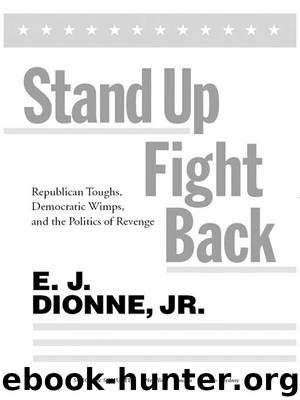Stand Up Fight Back by E. J. Dionne JR

Author:E. J. Dionne, JR.
Language: eng
Format: epub
Publisher: Simon & Schuster
Published: 2004-07-15T00:00:00+00:00
IV
The third shift in the language of politics goes back a long way, but is also of more recent vintage. It has to do with what constitutes being “tough” in dealing with enemies, both foreign and domestic. Since World War II, liberals and Democrats have faced regular accusations of being “soft” about something, sometimes many things. This is ironic, since the victory of 1945 was won under the leadership of two liberal and Democratic presidents, Franklin D. Roosevelt and Harry Truman.
That didn’t stop the attacks. In the late 1940s and 1950s, liberals were accused of being “soft on Communism,” a charge that came around again when most Democrats came to oppose the Vietnam War after Richard Nixon’s 1968 victory. And the view that Democrats were “soft on foreign policy” was successfully sold at the end of Jimmy Carter’s administration. The apparent advance of the Soviet Union—especially after its invasion of Afghanistan in 1979—and the failure to resolve the Iranian hostage crisis made it easy to portray an America that was ineffectual, even helpless, before a hostile world. As the journalist Michael Tomasky put it: “Carter’s paralysis over Iran was humiliating. Ascendant conservatives and neo-conservatives made short work of converting Carter’s failure into a symbol of American anemia.” Ronald Reagan defeated Carter handily in 1980 and his defense spending increases (along with an economic recovery) restored popular confidence.
Former U.N. Ambassador Jeanne Kirkpatrick highlighted the contrast between allegedly strong Republicans and allegedly weak Democrats at the 1984 Republican National Convention. Her attack was all the more pointed because of her standing as a former Democrat. Repeatedly, she assailed the “San Francisco Democrats”—the party held its 1984 convention that year in that very liberal city—who “blame America first.”
During the wave of urban violence that began in the late 1960s, Democrats were accused of being “soft on crime”—here again, Nixon played a key role in the attack—and too sympathetic to the rights of the accused, always rendered as “the rights of criminals.” The symbol of such “softness” became opposition to the death penalty. The first President Bush was singularly successful in using softness to win election in 1988 against Democrat Michael Dukakis. The Bush victory was built on a softness double-whammy. Dukakis was attacked for both softness and incompetence because a criminal named William Horton raped a woman in Maryland while on furlough from a Massachusetts prison. (Horton happened to be black, which added to the political kick of the assault on the state’s furlough program.) And Dukakis’s alleged lack of fitness to lead the country militarily was dramatized by unfortunate footage—created by the Democrat’s own campaign—showing the Massachusetts governor riding ineffectually around in a tank and looking for all the world, chortled the Republicans, like Rocket J. Squirrel.
After 1988 especially, combating the image of “softness” became a high Democratic priority. Democrats tried to argue that all the allegations of squishy softness were unfair and contrived for political purposes. And most of the time, the charges were manufactured. Most Democrats, from Harry Truman forward, were anti-Communists and mistrustful of the Soviet Union.
Download
This site does not store any files on its server. We only index and link to content provided by other sites. Please contact the content providers to delete copyright contents if any and email us, we'll remove relevant links or contents immediately.
American Kingpin by Nick Bilton(3888)
Future Crimes by Marc Goodman(3600)
The Meaning of the Library by unknow(2573)
Inside the Middle East by Avi Melamed(2357)
Why Nations Fail: The Origins of Power, Prosperity, and Poverty by Daron Acemoglu & James Robinson(2299)
On Tyranny by Timothy Snyder(2233)
Living Silence in Burma by Christina Fink(2072)
Putin's Labyrinth(2022)
The Mastermind by Evan Ratliff(1938)
The Smartest Kids in the World by Amanda Ripley(1856)
Think Like a Rocket Scientist by Ozan Varol(1822)
Law: A Very Short Introduction by Raymond Wacks(1750)
It's Our Turn to Eat by Michela Wrong(1731)
The Rule of Law by Bingham Tom(1699)
Philosophy of law a very short introduction by Raymond Wacks(1672)
Leadership by Doris Kearns Goodwin(1642)
A Dirty War by Anna Politkovskaya(1634)
Information and Communications Security by Jianying Zhou & Xiapu Luo & Qingni Shen & Zhen Xu(1622)
Civil Procedure (Aspen Casebooks) by Stephen C. Yeazell(1558)
